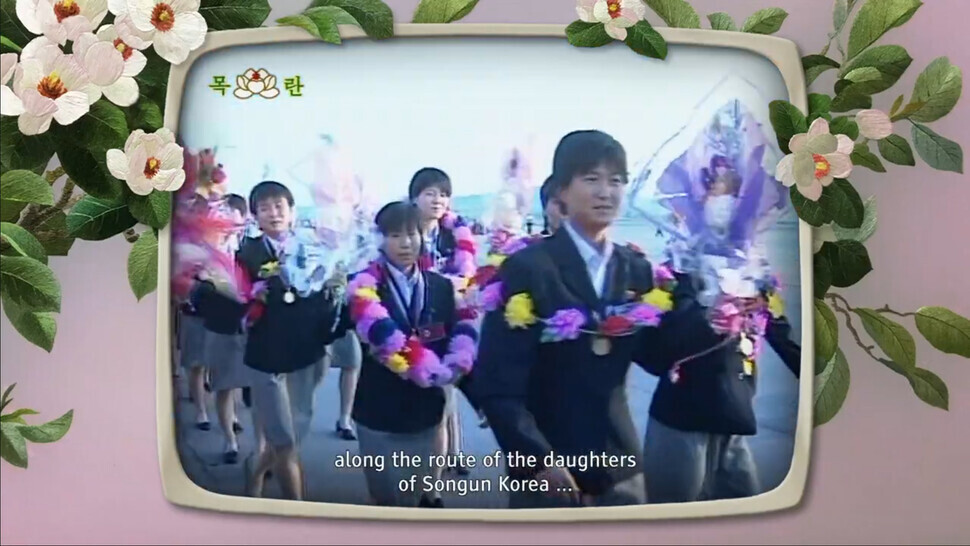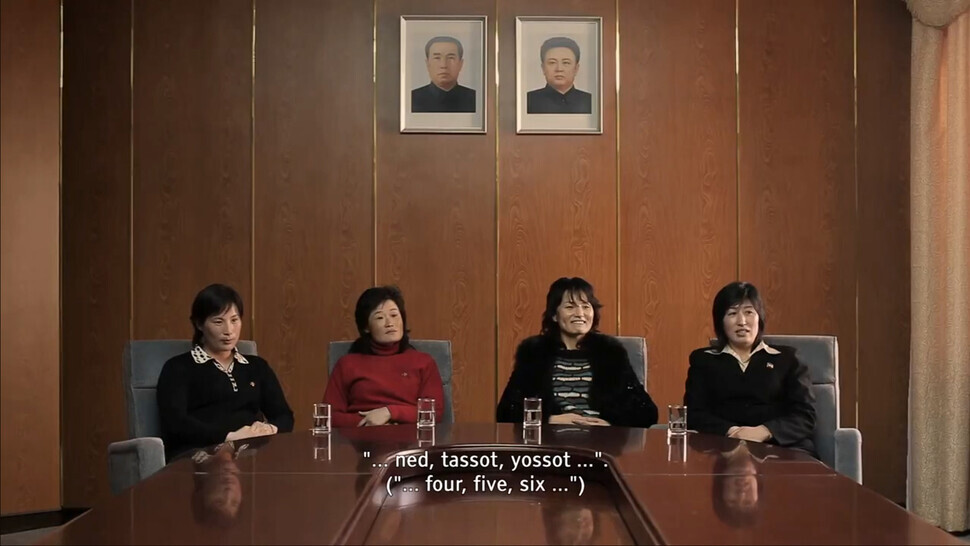hankyoreh
Links to other country sites 다른 나라 사이트 링크
New doc undoes stereotypes of N. Korea with candid portraits of women’s football legends

Norwegian pop band A-ha’s hit tune “Take on Me” captivated listeners worldwide with its simple melody and joyful rhythm. Yet I never thought I’d see the song being performed in North Korea. When I heard the song in a documentary about North Korea at this year’s Jeonju International Film Festival, I was overcome with a surreal feeling. A pop song that symbolizes young love and freedom being casually played in authoritarian North Korea? I wondered if the song made young North Koreans hum and dance along as I did back in the day. But then again, why would I assume that young people are any different in North Korea?
North Korea was once a hot topic in the world of documentaries. The country’s isolationism and reclusiveness made it a difficult topic to cover, and therefore sparked that much more curiosity. It was the perfect subject to stand out in the international art film scene. There was even a time when North Korean authorities welcomed international documentary filmmakers, even reaching out to certain filmmakers so that they could tell their stories. Perhaps it was an attempt to sort out the various rumors and guesses about life in North Korea.
Yet the majority of documentaries presented themselves as exposes of the North Korean regime. Some even employed hidden cameras in an attempt to uncover the dark underbelly beneath the smiling face of the government. These documentaries never questioned their own objectification of North Korea or their colonial viewpoint.
A few, however, managed to capture the lives of regular North Koreans without any political agenda. These days, however, it’s difficult to find a documentary that isn’t just an expose on the North Korean regime but an explorative attempt to cover a wide spectrum of issues regarding North Korea. Some of this is due to the pandemic, but the biggest problem is the lack of filmmakers willing to focus on people rather than the regime.

A project 20 years in the making by an Austrian filmmaker
“Ned, Tassot, Yossot” (2023, directed by Brigitte Weich), which screened at this year’s Jeonju International Film Festival, is a masterpiece that depicts the lives of North Korean women and the changes in their consciousness over the years. The film is a follow-up to Weich’s “Hana, Dul, Sed” (2009), and continues to follow the lives of four former members of North Korea’s national women’s football team — Ra Mi-ae, Ri Jong-hi, Jin Pyol-hi and Ri Hyang-ok — this time, after their retirement. The North Korean women’s team won the 2003 Asian Cup and made it to the quarterfinals in the 2007 Women’s World Cup.
While “Hana, Dul, Sed” focused on the achievements and height of the success of the national team, “Ned, Tassot, Yossot” turns to how the individual lives of the four players are represented in state narratives. It intersperses footage from a North Korean soap opera “Our Women’s Football Team,” which is a dramatization of their lives.
Filmmaking in North Korea is no easy task. Documentaries, which by nature are supposed to show reality as it is, are even more difficult. The North Korean government decides when and where you can shoot. During an interview with the Austrian Film Commission, Weich said during her first film, it was very difficult to “completely capture” all the buildings, statues, propaganda and photographs of the North Korean leader she saw. While filming the athletes, the camera would inevitably shoot a part of a building here or a portion of the surrounding cityscape there — but the North Korean authorities forbid her from using the footage.
Weich has spent the past 20 years covering the North Korean women’s soccer team, however, because of their undeniable draw: how, despite their circumstances, they devote themselves to their craft and to living.
The documentary begins with an interview of the four retired athletes. Hovering behind them throughout the film are two portraits of former North Korean leaders. With smiles, the women remark that, unlike the other filmmakers who have shot them before, Weich didn’t give off the impression that she was going to use the footage to portray North Korea in a negative way. They grew to trust Weich, allowing them to be more open in sharing their thoughts.
Despite the hardship of their conditions in the greater perspective, the women went on to win international competitions, all thanks to “our beloved leader and country.” But they also provide objective evaluations of the conditions they were in. They talk about how their international peers ”get enough calories” and “have better conditions in every respect,” while openly acknowledging that their conditions were so dismal they say: “The rest of the world wonders: ‘How do they win eating what they eat?’”
Taking a second look at the simplification of North Korea
Most of the documentaries I’ve seen on North Korea show people parroting the regime’s slogans and propaganda about the superiority of their people and their country. But this kind of depiction cuts the entire population into a simple binary: the ruthless authoritarian regime and its helpless victims. The women in Weich’s documentary, however, acknowledge — albeit, indirectly — the shortcomings of their homeland, thereby dismantling this simplified binary. Instead, we see real people with actual agency.
The film allows viewers to see for themselves how these women are no different from women anywhere else in the world — they’re people who, despite it all, push themselves even when the going gets tough and the conditions are trying, all in order to achieve their hopes and dreams.
Furthermore, the film depicts how the lives of these four women mirror the lives of countless other women across the globe. From their experiences being told off by men who said football wasn’t for girls when they first started the sport, to how they put just as much effort into their appearances as their time on the field, the film shows how these women have gone many of the same things that most women anywhere in the world have at one point or another.
Another example of this can be found in the story of how one woman made the difficult choice to terminate her pregnancy after retirement so that she could focus on her new career, and the effort she puts into pulling off the difficult balancing act between having family and social success that she navigated, even as she felt judged by those around her for not having children.
Because of this, the cross cuts of the four women’s individual achievements, small but meaningful, that appear at the end of the film come across as all the more sublime. Their faces, weathered from their long and lonely fights, exhort viewers to rethink reducing North Korea to its regime or ideology, and to envision it as a complex place made up of complex people.
This is not all to say that North Korea is depicted with rose-colored glasses or as a normal country in the film. The documentary nonetheless is able to pull back the curtain on a different North Korea by following the small acts of kindness and sincerity with which these women go about their lives. At a time when exchange and cooperation with North Korea has been severed, “Ned, Tassot Yossot” refreshes our memory of the vast array of faces and people that make up our northern neighbor.
I wonder if as a first step for finding an exit ramp from the antagonistic inter-Korean ties of today, we in the South could envision the faces of North Koreans, filled with complex emotions. At a time when we’ve not simply forgotten the everyday people of North Korea, but painted over them with a broad brush of prejudice and reduced them to puppets or drones, the act of reminding ourselves that North Koreans aren’t so different from you and I is how we’ll make it through this time of disconnect.
By Kim Sung-kyung, professor of North Korean society and culture at the University of North Korean Studies
Please direct questions or comments to [english@hani.co.kr]

Editorial・opinion
![[Editorial] Seoul must use tact and diplomacy to check deepening Russia-NK ties [Editorial] Seoul must use tact and diplomacy to check deepening Russia-NK ties](https://flexible.img.hani.co.kr/flexible/normal/500/300/imgdb/original/2024/0614/8417183518068633.jpg) [Editorial] Seoul must use tact and diplomacy to check deepening Russia-NK ties
[Editorial] Seoul must use tact and diplomacy to check deepening Russia-NK ties![[Editorial] Thorough audit, evaluation of oil test drilling are needed [Editorial] Thorough audit, evaluation of oil test drilling are needed](https://flexible.img.hani.co.kr/flexible/normal/500/300/imgdb/original/2024/0610/2017180109432618.jpg) [Editorial] Thorough audit, evaluation of oil test drilling are needed
[Editorial] Thorough audit, evaluation of oil test drilling are needed- [Editorial] Yoon prioritizes his administration over South Korea’s safety once again
- [Column] The monumental shift in N. Korea’s nuclear program that never happened
- [Editorial] Yoon must submit himself to questioning over Marine investigation interference
- [Editorial] Court’s reversal of prosecutor’s impeachment will only embolden his peers
- [Column] How Korea’s restaurant servers went from being called ‘aunties’ to ‘bosses’
- [Column] Samsung’s screwup, Lee Jae-yong’s crisis
- [Column] The growing price of maintaining the president’s ego
- [Column] Taiwan’s new president bucked China’s silent demands for neutrality — now what?
Most viewed articles
- 1Propaganda leaflets are ‘paper bombs’ — should S. Korea be letting private actors drop them?
- 222 years later, Korean girls killed by US troops remain a symbol of the price of military tensions
- 3As Putin visits Pyongyang, Seoul to host Chinese diplomatic, security officials for dialogue
- 4‘That will not work’: Joan Williams says cash handouts won’t make Koreans have kids
- 5First-ever protest encircles the US embassy in Seoul
- 6Japanese media’s “one-sided” reporting on comfort women issue
- 7Memorial for 2 girls killed by US armored vehicle to be replaced by peace park
- 8[Column] Anatomy of a falling birth rate, from 4.53 to 0.72 in Korea
- 9[Column] Why UK media is obsessed with North Korea
- 10S. Korea flouts UN body’s call for reparations for sex-trafficked Filipinas